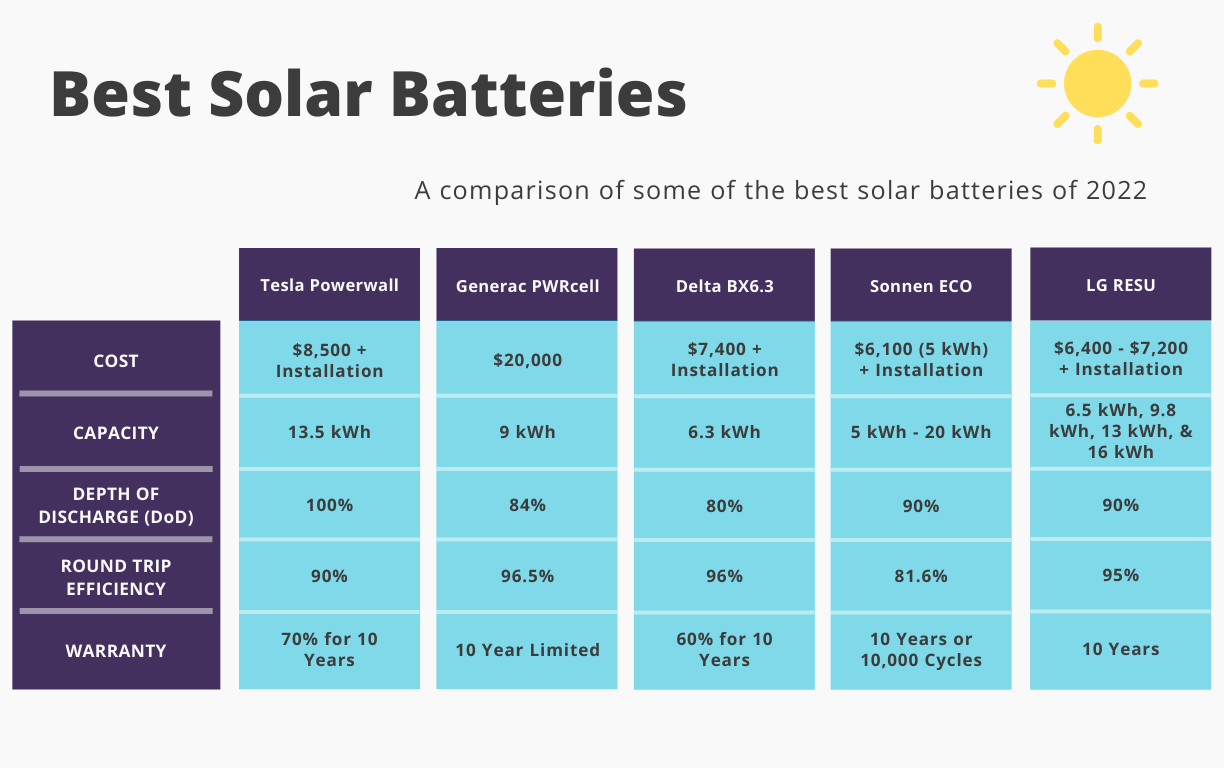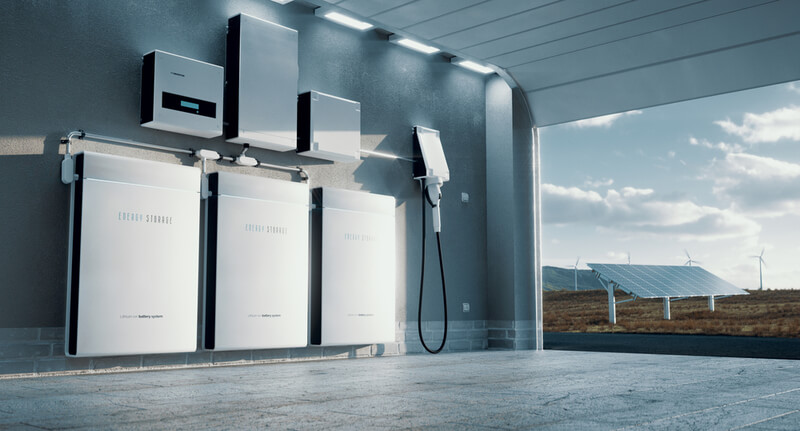Choose the best solar battery for your home
Finding the best solar battery is a smart investment for homeowners with solar systems. Solar batteries allow consumers to save energy generated from solar panels to use later. By investing in solar batteries, you can increase your energy independence, lower your monthly electricity costs, and improve the efficiency of your solar panel system.
Are you interested in finding the best solar battery for your home? This guide will walk you through the best solar batteries in 2022 and how to choose the right option for your energy needs.
Key terms referenced throughout this article:
- Capacity: Amount of energy your battery can store.
- Depth of discharge (DoD): Amount of energy you can use from a fully-charged battery.
- Duration: Amount of hours a battery can run before recharging.
- Round-trip efficiency: Amount of energy a battery will supply after accounting for the energy it needs to function.
What are the best solar panel batteries?
As home solar has grown in popularity, so have solar batteries. According to the SEIA, about 25% of solar systems will be connected to battery storage by 2025 — compared to 6% in 2020. Solar panel batteries are increasingly popular with residential solar systems and solar panels on RVs, campers, and trailers.
Following are the best solar batteries of 2022:
- Tesla Powerwall
- Generac PWRcell
- Delta BX6.3
- Sonnen ECO
- LG RESU
According to the Energy Information Administration (EIA), the average residential customer uses about 877 kilowatt-hours (kWh) per month. This equals approximately 30 kWh of energy each day. When searching for the best solar battery for your home, check the battery capacity to ensure it will meet your energy needs. Find details and other key features about the best solar batteries below.

Tesla Powerwall
The Tesla Powerwall is one of the most popular solar batteries on the market and costs $8,500 before installation costs. This solar battery offers a capacity of 13.5 kWh — almost half of the average amount of energy consumed in a household each day. The Tesla Powerwall has a Depth of Discharge (DoD) of 100%, which means the total battery charge can be used without negatively affecting the battery’s lifespan. The Powerwall also has a round-trip efficiency of 90%. This percentage means 90% of the battery charge is used for energy, and 10% is for the battery to function. Additionally, the Telsa Powerwall battery has a round-trip efficiency warranty of 70% for 10 years.
Generac PWRcell
The Generac PWRcell battery offers up to 18 kWh of continuous backup power when paired with a solar panel system. This battery has a budget-friendly modular design, so you can start small and add more battery power later if needed. The Generac PWRcell also comes housed in an “Outdoor Rated” battery cabinet for indoor or outdoor storage, regardless of climate. Depending on the size of the battery you select and including installation, a Generac PWRcell will run about $13,000 to $20,000. This battery comes with a 10-year limited warranty and a round-trip efficiency of 96.5%.
Delta BX6.3
The Delta BX6.3 battery comes with a total capacity of 6.3 kWh and 80% DoD. Before factoring in installation, the Delta BX6.3 solar battery costs about $7,400. This battery offers a whisper-quiet convection cooling system that eliminates fans and pumps. It also has a 10-year warranty with a guaranteed 60% battery capacity.
Sonnen ECO
The Sonnen ECO solar battery is an interesting option for consumers because it is sold in 2.5 kWh modules at 90% DoD. Homeowners can invest in as few or as many solar batteries as they need for their homes. Battery capacity begins at 5 kWh (two batteries) and can reach up to 20 kWh. For a 5 kWh system, the Sonnen ECO would cost about $6,100 before installation costs. Sonnen ECO batteries have a 10-year warranty.
LG RESU
The LG RESU solar battery comes in a variety of sizes, including 6.5 kWh, 9.8 kWh, 13 kWh, and 16 kWh options. The DoD for these batteries is 90%. They include a warranty of 10 years and a cycle life of up to 4,000 cycles. The price for LG RESU batteries is based on the capacity but typically ranges between $6,400 and $7,200 before installation.
Interested in solar, but not sure where to start? We’ll help you take the first step. Fill out the form on this page to learn more.
How to find the right solar battery storage
There are several factors to consider when shopping for the best solar battery. A few things to keep in mind include:
- Battery capacity: Your battery’s capacity is how much energy — measured in kilowatt-hours (kWh) — it can store at once. The average solar battery has a capacity of about 10 kWh.
- Depth of discharge: The depth of discharge (DoD) is the amount of energy you can draw from a battery before impacting its lifespan. Typically, if you draw 100% of a battery’s charge, it will shorten its lifespan. The average home solar battery is 10 kWh. If that battery has a DoD of 80%, you wouldn’t want to consume more than 8kWh from the battery without allowing it to recharge. The higher the DoD, the more power you can pull from the battery at one time without causing harm.
- Battery duration: This measures how many hours a solar battery can run without recharging. Battery duration depends on the type of battery. On average, a utility-scale lithium-ion battery can run for up to 4 hours. Battery duration will increase with battery banks — or a collection of batteries working together. Keep in mind the less energy you consume, the longer a solar battery will power your home.
- Round-trip efficiency: This measures how efficiently a battery can run during one cycle. Like many items in your home, batteries need energy to run. This means they will consume some of the energy that they store. Round-trip efficiency is the percentage of electricity you can get back from the battery after consuming the energy it needs. If the average 10 kWh battery only lets you draw out 8 kWh, that means it has an 80% round-trip efficiency. Round-trip efficiency differs from DoD because it measures one battery cycle vs. DoD measures a battery’s total lifespan.
- Battery lifespan and warranty options: A battery’s cycle consists of one charge and one discharge. Once a battery has been through multiple cycles, its ability to hold a charge will decrease. Warranties provide a guarantee that a battery will last a certain amount of cycles or years, often at a guaranteed capacity. For example, a solar battery distributor may offer you a battery with a warranty of 10 years or 5,000 cycles, and guaranteed to retain an 80% battery capacity during that amount of time or cycles.
- Battery types: There are several different types of solar batteries, which can impact the efficiency of your solar panels. Read on to learn more about the best types of solar batteries available.
Solar backup battery types
A study by the Lawrence Berkeley National Lab found that solar projects are almost six times more likely to be paired with batteries than other renewable energy sources, such as wind and natural gas. However, there are different kinds of batteries in the solar market to store excess energy. The most common battery types for residential solar systems are lead-acid or lithium-ion batteries. Monocrystalline and polycrystalline solar panels or solar roof shingles can all use solar batteries.
Lead-acid solar batteries
Lead-acid batteries tend to cost less than other types and are older technology. They also tend to have larger dimensions than newer types of batteries. Lead-acid batteries normally have a lower DoD and need to be recharged often. These types of batteries aren’t common for homeowners who want to power their homes with solar energy every day, but can work well as a backup solution in the event of a power outage.
There are two varieties of lead-acid batteries, including:
- Flooded lead-acid battery – These batteries have a longer lifespan, however, they require some maintenance, such as refilling with distilled water every few weeks.
- Sealed lead-acid battery – These do not require maintenance or regular upkeep. One thing to note is that sealed lead-acid batteries never fully charge in order to avoid water depletion and gas dispersal.
Lithium-ion solar battery
Lithium-ion batteries are newer than lead-acid and are normally smaller and lighter. They also tend to have a longer DoD and a minimum lifespan of 10 years. Another plus of lithium-ion batteries is that they are lower-maintenance than many of the alternatives.
Other solar battery types
- Lithium-polymer battery: These are similar to lithium-ion batteries, but tend to be more expensive and have a shorter lifespan. The plus side is that they are protected against overcharging or leakage.
- Deep-cycle battery: These solar batteries are best for keeping a consistent stream of power over a longer period of time.
- Saltwater battery: These solar batteries use saltwater as an electrolyte, making them a more natural and environmentally-friendly option. Saltwater batteries are also maintenance-free and normally have a long lifespan.
- Solar gel battery: For solar owners who move around a lot, solar gel batteries are a good option. These batteries don’t have to remain upright, meaning they handle moving around well, and are an ideal battery for owners of RVs or people who want to travel with a solar battery.
How do solar batteries work?
Solar batteries store the extra energy generated by a solar panel system. The majority of homeowners consume the most electricity in the mornings and the evenings as they wake up or get home from work. But solar panels often generate the most energy in the middle of the day when the sun is shining the most. With a solar battery installed, solar panels can continue producing electricity and storing it for later use, even when you are away from home.
An advantage of a solar panel system with a battery is that you can increase your energy independence, lower your total electric costs, and improve your solar panels’ reliability. Plus, you can prepare for times of high demand when the electricity supply runs low, such as during winter weather events.
Installing solar batteries
Either your solar installer or an independent technician can advise you on the best place to install a solar battery. Still, most people choose the garage because it is out of sight yet near the main electrical panel, which will need to be wired to the battery. Think carefully about the placement of the battery because it is permanent. A technician will also install a transfer switch. The transfer switch alerts your power system to start using the backup battery power when the power goes out. An optional feature for your solar battery installation is a critical load panel. This panel limits what appliances will be using power during an outage which may be necessary if you have essential items that must stay on, such as medical equipment.





